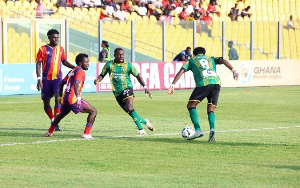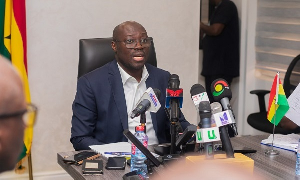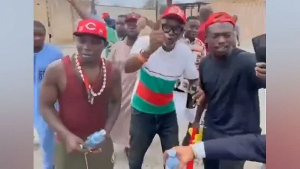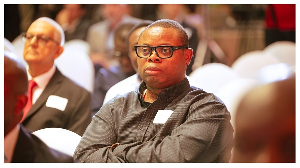I had the opportunity last week to watch the full 89 minutes of ‘An African Election’, the film by Jarreth Mertz, and it struck me that not a single shot of the movie featured the man who gladly accepted the nickname Obama in the 2008 presidential polls. I had to watch the film again and again but still could not spot John Mahama, the man many believed swung it for Prof Mills on his third run at the top job.
I remember saying to myself, “Rawlings would be very angry after watching this movie.” This is because the film depicts the immense contribution the NDC founder made to Mills’ victory. You get to feel the high voltage of electricity he generates among grassroots voters. You may not like him... just concede... the man is the biggest crowd puller since Kwame Nkrumah.
There is a sense that over our presidential history (Nkrumah had no number 2) the vice president has been a wasted asset. With no defined role, no Ghanaian vice president has been anywhere near as half as powerful as Dick Cheney.
John Mills was head of the national economic management team before 2001 and we all know what happened to the economy. John Mahama is currently the head of the national economic management team. And, we all know all so well what is happening to the economy.
John Mahama, because of President Mills’ ostensible ‘fear of flying’ and Reagan-like light daily public schedule, tends to be seen more and heard more. But, those working close to him will tell you, apart from reading speeches, shaking hands and smiling to the cameras, he doesn’t see much of the show. “He can only smell the soup from the kitchen,” one aide lamented. He may be peeping in from behind the kitchen cabinet!
In the course of the Fourth Republic, it has been very difficult to quantify the electoral contributions of running mates since no ticket has so far done anything to upset the two-term thing. So, in considering a running mate, the first test is not to go for one who has the potential of putting voters off. He may not be exciting but he must not be upsetting.
Akufo-Addo and Bawumia needed some 22,000 votes swing to give NPP a third consecutive term. Did Bawumia help to get Akufo-Addo that close or could another candidate have done better? The answer to the question above is bound to be more subjective than objective. Vice President Kow Arkaah, in my view, helped the NDC because he added to the (P)NDC strategic process at the time of annexing the Nkrumaists. Mills, like Arkaah the Nkrumaist before him, was brought in, inter alia, to make the Fantes and the educated middle class comfortable with the NDC.
It was only in 2000, when he had to lead the charge himself that he was found to be woefully wanting, failing in his own backyard in the Central and Western Regions. Was he simply a victim of the tide? After all, he recovered in 2008. Aliu Mahama was what one may call, a safe pair of hands. Not exciting but effective enough to mollify the Muslim-Northern voter bloc. Thus, before pushing any candidate rank him against the others by their usefulness to the flagbearer and just make sure he has not a show-stopper problem.
Overall, it can be said that a running mate is really only there to bring some balance to the ticket and to try make up for whatever flaws or weaknesses the candidate may have. He may fill a gap in experience as Dick Cheney did for George W Bush or a disconnection with the youth as John Mahama did for Mills.
In choosing a running mate, the NPP should be mindful of having a divided ticket to start with. How the presidential candidate feels about his No. 2 is, perhaps, the most important consideration. But, that does not mean he cannot be helped to like a good nominee who can make some demographic inroads.
In my analysis, while choosing a candidate from the North helps the NPP to neutralise any sectarian charge, the battle lines are not to be drawn on regional or religious considerations. The two main constituencies in the 2012 elections are gender and age: women and the youth.
These two groups cut across all lines – ethnic, class, regional, religious, etc. Beyond satisfying the North-South ticket, a candidate who can help Nana Akufo-Addo reach out to these two groups will be my choice.
On issues, every survey I have seen has identified four key ones: by far the biggest issue out there is unemployment. It is difficult to see how the Mills-Mahama ticket can recoup any credibility on the big issue of jobs.
The second most important issue is cost of living – economic hardship. The NPP, with Akufo-Addo in the lead, must be able to articulate an economic programme that the ordinary Ghanaian can buy into as offering hope he/she can believe. The big transformation idea is fine but what does that mean to a 25-year-old JHS drop out in the small town just looking for a regular income?
The third issue is disaffection. Voters are upset. They are disappointed about the broken promises. They are not happy about the direction that Mills and Mahama are not taking the country. But, how can this wave of disaffection against the NDC be turned into affection for the NPP?
It is not going to be easy if the refrain of ‘all politicians are the same’ is allowed to catch fire. Disillusionment with politicians translates into voter apathy. Low voter turnout can help the incumbent.
Could this be the reason why three of the frontrunners are respected and experienced technocrats? But, why should there be frontrunners? It creates the false impression that the position of a running mate is a competitive one – by election rather than selection. The fourth issue is corruption sometimes, swapping with education. When all is said and done, it is Nana Addo whose picture will be on the ballot paper and whose vision should be on voters’ mind.
I have been observing all the lobbying go around and people’s views on why it should be A and not B can be interesting. There are all manner of interests being pushed. But, the only two that are relevant are (1) who can help Nana win and (2) who can help him govern. The first may be more important from the onset, but can be difficult to tell sometimes.
There are those whose choice of preference may be influenced more by succession consideration than success in 2012. There are those who may limit their preference to internal party considerations and others who may look beyond the party to the swing votes. The choice hardly ever falls on the lap of the one who lobbies most. In fact, over-lobbying can rather put the presidential candidate off. Make yourself known but don’t be too known.
A 1964 conversation caught on the White House taping system emphasises the folly in lobbying. President Lyndon Johnson, a former vice president himself, in a conversation with his aide, Sargent Shriver:
"I think a man [who] runs for vice president is a very foolish man," said Johnson, who was considering his own choice of running mate at the time. The “man who runs away from it is very wise. I wished I'd run farther away from it than I did. … And don't you ever be a candidate and don't let anybody else be a candidate, and tell them anybody that runs for it never gets it.”
Let me repeat, “tell them anybody that runs for it never gets it.” Shriver took his boss’ advice to become George McGovern's running mate eight years later when Shriver had to step in after Thomas Eagleton was forced to step down amid controversy.
Johnson expressed this view at a time that he was being pressurized to choose the slain JFK’s brother, Attorney General Robert F Kennedy, as his No. 2.
New York City Mayor Robert Wagner sent a message to the party through journalists, to give LBJ space to make his own choice.
Wagner said, "they don't want the president to be required to sleep with anybody he doesn't want to sleep with, and he ought to have a man with vice president that he trusts and likes and can work with him.”
Johnson was himself chosen reluctantly by J F Kennedy for party unity, stepping up after JFK’s assassination.
My plea with the NPP is that they should help Nana Addo choose his running mate but should resist the temptation to choose his running mate for him.
As Obama and McCain were preparing to choose their respective running mates in 2008, the octogenarian former vice president, Walter Mondale observed: “It may be the most important decision they make — or at least one of the most important of their presidency — and it's the one thing that they basically control.”
The NPP should allow the flagbearer to control this decision. And Modale tells us why: “It is risky because if you make a mistake, a serious mistake, it's like a bad marriage. Only you can't get a divorce.”
As one observer sees it, it is not like choosing a double act for a stage performance. “It's more like a CEO picking a COO (chief operating officer), an editor-in-chief picking a managing editor. You need someone you can work with … and you need someone who is a potential successor in the event of crisis or calamity."
And someone who can help you get to the Jubilee House.
The author is the Executive Director of the Danquah Institute.
gabby@danquahinstitute.org
Opinions of Friday, 2 December 2011
Columnist: Otchere-Darko, Gabby Asare














